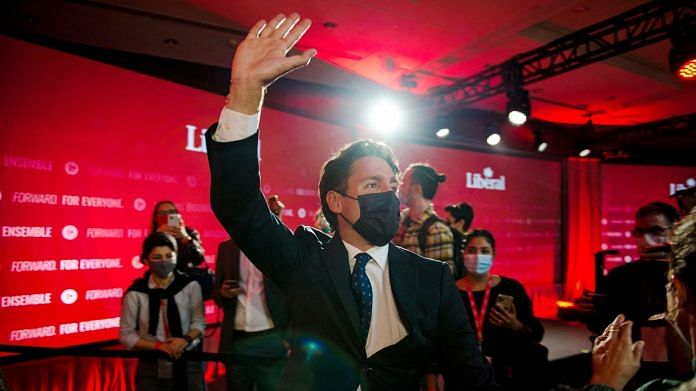Toronto: Prime Minister Justin Trudeau won a third term in Canada’s snap election but fell short of regaining the majority he was seeking, faced with relying on smaller parties in another fragmented parliament.
Trudeau’s Liberal Party was elected or leading in 156 of the 338 seats in the House of Commons as of 1:40 a.m. Tuesday in Ottawa, little changed from the last vote in 2019. The main opposition Conservatives, under Erin O’Toole, were ahead in 122 seats, one more than they won last time.
While Trudeau is likely to be able to pursue his left-leaning agenda with the backing of other parties in parliament, he lacks the broad-based support from voters needed to govern alone.
For a second straight election, his party lost the popular vote to the Conservatives and won only because of a strong showing in Toronto, Montreal and other cities.
With more than 90% of polls reporting, the Liberals had just 31.8% of the national vote. That would be the lowest share for any governing party in the nation’s history. The Conservatives stood at 34.1%.
The results reflect a nation that’s unsure about its immediate future amid a fourth wave of the Covid-19 pandemic. Canadians are dealing with growing debt levels and concerned about a future transition from an oil-producing nation to a low-carbon economy. Party leaders struggled to find a coherent message with which to unite the electorate, pollsters said.
“That’s a damning assessment of the frontrunners from Canadians, reflecting for them, a lack of inspiring choices,” said Shachi Kurl, executive director of the Angus Reid Institute, a Vancouver-based polling firm.
Division of votes
Resource-rich western Canadians again voted heavily for Conservatives, a party more supportive of the energy sector. Quebeckers chose to send nationalists to legislature in large numbers, instead of siding with Trudeau’s federalist party.
To be sure, Trudeau will have a stable minority. He has multiple potential partners to pass legislation, giving the prime minister maximum leverage. The New Democratic Party was ahead in 27 seats, while the Bloc Quebecois had 31. Each has enough to push the Liberals beyond the 170 votes in parliament needed to pass legislation.
“I hear you when you say we can only move forward if no one is left behind,” the prime minister told supporters in Montreal after declaring victory.
Trudeau’s government will be able to continue with a big-spending agenda, and move ahead with other campaign pledges including higher taxes for financial institutions and businesses and stricter emission rules for the oil and gas sector.
“This points to ongoing heavy fiscal support and some upside bias towards wider deficits in the medium term,” Doug Porter, chief economist at Bank of Montreal, said by email. “Of course, since it seems we will be dealing with a minority government, the specifics will remain fluid.”
The Liberal victory is a historic milestone for Trudeau, marking only the eighth time a Canadian leader has won three successive elections. Trudeau’s father, Pierre, also did it. It also represents a comeback of sorts for Trudeau, whose party was trailing in the polls midway through the five-week campaign.
Still, failure to secure a majority and losing the popular vote is a disappointing result. It’s the second time voters have denied this prime minister full control of the legislature, limiting his freedom to take big risks or govern unilaterally.
Challenges of minority govt
Minority governments have become familiar to Canadians. The past seven elections have now produced five minority governments. They’re popular because they require the participation of several parties to make laws.
But there’s a downside. Minority parliaments keep parties on constant campaign footing and give them less scope to consider long-term issues. In practice, that means politicians are wary of tackling big problems like Canada’s sagging competitiveness or slow transition toward a low-carbon economy.
“The economic challenges ahead of us are significant,” Robert Asselin, senior vice president of policy at the Business Council of Canada, said by email. “We are going to need a longer-term approach to growth.”
Since the 2019 election, the Canadian currency has been the second-worst performer among G-10 currencies against the U.S. dollar. The country’s benchmark S&P/TSX Composite Index is up 23%, barely half the gain of the S&P 500.
Trudeau largely had control over the economic agenda last month before he called the election, with all three opposition parties at one point backing his emergency borrowing to pay for the Covid-19 response.
The Liberals passed a budget in April with C$140 billion ($110 billion) in new spending measures, with support from the NDP. Even the Conservatives largely supported the Liberal government’s pandemic support measures through much of last year.
But the prospect of the Liberals linking up with the New Democrats on policy could prompt an even more leftward shift. The NDP wants to raise tax rates on corporate income and capital gains, as well as on wealthy individuals.
The election outcome also amounted to a rejection of O’Toole, the Conservative leader whose gamble to move his party closer to the political center with a moderate platform failed to win enough voters to offset losses to his right.
“There are no winners here,” Darrell Bricker, global chief executive of Ipsos Public Affairs, said by email.- Bloomberg
Also read: Canadian-Pakistani YouTuber couple cry racism but Instagramers ask for unedited reels



